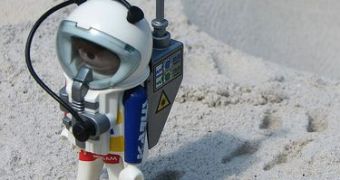During long space flights, astronauts' muscles lose their capacity for physical work by over 40 percent, concluded a new American study, led by Robert Fitts, Chair and Professor of Biological Sciences at Marquette University, Milwaukee, Wisconsin.
This research, published online by The Journal of Physiology present in the September printed issue, comes at a time when interest in Mars and in its early life is increasing, and as NASA estimates that a crew would spend almost three years in space for a one year mission on Mars, this study becomes crucial for an adequate mission preparation.
For the first cellular analysis of the effects that a long space flight can have on human muscles, scientists took calf biopsies of nine astronauts and cosmonauts before and right after they had spent 180 days on the International Space Station.
Results showed an important loss of fiber mass, force and power in this muscle group, and even a better physical condition at the beginning of the journey did not help, as the crew member that had the biggest muscles at first, presented the highest muscle decline.
This is just like having an individual aged 30 to 50 years with the muscles of an 80-year-old.
As apparently in-flight exercises are not enough, the negative effects of weightlessness to the skeletal muscle pose a serious risk for future manned missions to Mars or other planets.
Fitts said that if astronauts were to travel to Mars today, their muscles would decline by nearly 50% and their ability to work would be seriously compromised.
He added that besides the fact that crew members would tire very quickly, they would also have serious problems in performing any kind of routine work in a space suit, and their return to Earth would be very dangerous as they would not be physically able to evacuate rapidly in case of an emergency landing.
Professor Fitts says that he supports extended space travel and he compares the next mission to Mars with the Western Hemisphere, 800 years ago.
“Without exploration we will stagnate and fail to advance our understanding of the Universe,” he adds and he suggests that a good solution would be the design and testing of more efficient exercises on the ISS, before taking off for distant space journeys.
He believes that efforts on fully using the ISS should be made, so that better ways of protecting the muscles and bones can be developed, and he recommends that the shuttle should be replaced by a vehicle that would allow crew members to quickly evacuate the ISS in case of emergency.

 14 DAY TRIAL //
14 DAY TRIAL //